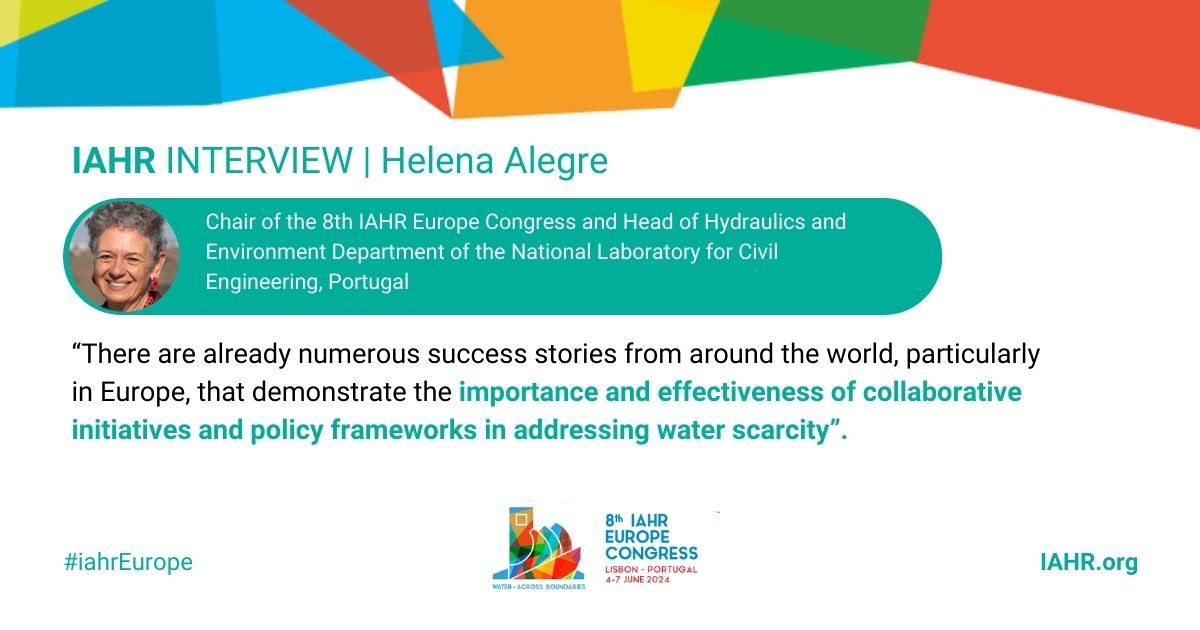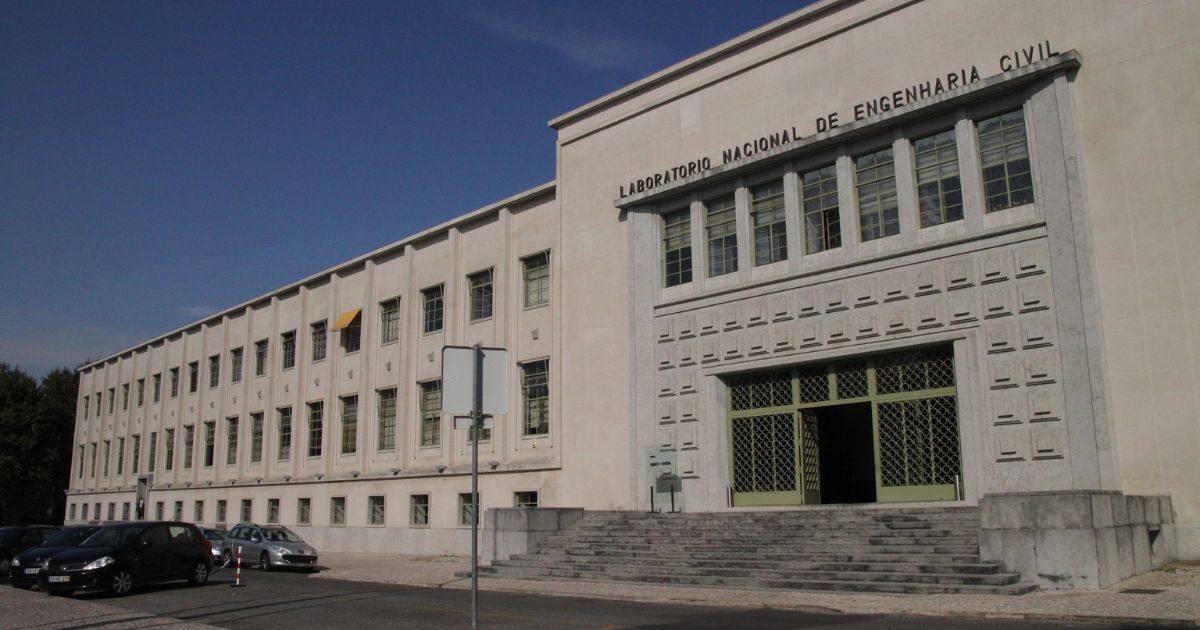Interview with Helena Alegre, Chair of the 8th IAHR Europe Congress

Ana Margarida Bento, Editor of Newsflash Europe interviews Helena Alegre, the Head of the Hydraulics and Environment Department at the Portuguese National Laboratory for Civil Engineering (LNEC) and Chair of the 8th IAHR Europe Congress "Water - across boundaries" which will be held in Lisbon in June 2024. Dive into the visionary insights of Dr. Helena Alegre as she illuminates the way forward for urban water management in an exclusive interview with LNEC. Explore the dynamic evolution of urban water systems, driven by new technologies and a commitment to sustainability. Discover strategies for resilience and efficiency, underpinned by data analytics and digital innovation. Join us in uncovering the transformative potential of collaborative initiatives and policy frameworks as we collectively shape the future of water infrastructure. Don't miss the opportunity to gain invaluable insights from Dr Alegre's expertise. Read her interview and embark on a journey towards smarter, more sustainable urban water systems.
Looking ahead, how do you see urban water systems in Europe evolving over the next decade, taking into account emerging technologies and evolving environmental challenges?
 Urban water systems need to evolve in a way that actively contribute to water smarter societies. Quoting B-WaterSmart, “societies are water-smart when they generate societal well-being via sustainable management of water resources. In water-smart societies, well-informed citizens and actors across sectors engage in continuous co-learning and innovation to develop an efficient, effective, equitable and safe circular use of water and the related resources. This is achieved by adopting a long-term perspective to ensure water for all relevant uses, to safeguard ecosystems and their services to society, to boost value creation around water, while anticipating change towards resilient infrastructure.”
Urban water systems need to evolve in a way that actively contribute to water smarter societies. Quoting B-WaterSmart, “societies are water-smart when they generate societal well-being via sustainable management of water resources. In water-smart societies, well-informed citizens and actors across sectors engage in continuous co-learning and innovation to develop an efficient, effective, equitable and safe circular use of water and the related resources. This is achieved by adopting a long-term perspective to ensure water for all relevant uses, to safeguard ecosystems and their services to society, to boost value creation around water, while anticipating change towards resilient infrastructure.”
Urban water systems need to evolve to become more efficient, more resilient, safer and more secure.
I anticipate that urban water systems will evolve into hybrid systems, combining centralized and decentralized solutions, leveraging new technologies such as reliable local treatment options and more affordable, reliable sensing and local or remote-control systems. This approach will enable us to capitalize on local opportunities and foster more circular economies. This evolution demands prudent infrastructure asset management, prompting a re-evaluation of existing infrastructure and seizing opportunities for change through rehabilitation interventions.
We are beginning to observe blurred boundaries between traditional urban water services: drinking water supply, wastewater, and rainwater management. This is so because reclaimed water and rainwater are becoming increasingly important water sources, while wastewater treatment plants are transforming into resource recovery facilities. Moreover, fit-for purpose water sources are gradually being used in urban areas, rather than exclusively relying on drinking water for all purposes. Consequently, the offer of water, with different quality characteristics, will increasingly coexist within the same geographical areas, mobilizing more stakeholders for its management.
The concept of circular economy necessitates a greater utilization of nature-based solutions (NBS), which represent a crucial avenue to pursue. NBS processes tend to be slower and require more land for equivalent results, compared to more technologically intensive alternatives. Their feasibility comes from the adoption of multi-purpose solutions, such as utilizing NBS for recreation or parking areas.
Technology can and should support all these trends.
Conversely, this evolution brings forth new challenges, some of which are yet to be fully addressed, particularly in terms of governance, business models, and regulation.
As we anticipate future urbanisation trends and population growth, what strategies do you believe will be critical to ensuring sustainable and resilient water management practices in European cities?
In my view, creation of enabling environments for a smarter use of water via public policy instruments is highly desirable. Examples of critical aspects of such public policy are:
Establishment, implementation and monitoring of regional / national strategic plans or strategic agendas.
Revisiting the legal framework, at European and national levels, identifying gaps and barriers, and creating incentives for change.
Adequation of the education curricula, particularly the graduation and post-graduation.
Creation of the adequate competences in the water utilities by capacity building initiatives and professional training of the staff.
Exploration of new governance models that address the added complexity of the emerging urban water systems.
Exploration and implementation of a tariff and tax policy that ensures the financial feasibility and sustainability of the systems, accounting for multi-purpose solutions.
Ensuring the mobilization of the financial resources needed to implement the strategic plan / agenda.
Promotion of problem-driven research and innovation, fostering co-production and knowledge transfer and promoting a strong link between the knowledge and practice.
Engagement of the society via awareness, education, incentives, and governance models involving citizens, with clear roles and responsibilities.
Enabling and promoting creative, healthy and sustainable enterprises that contribute to accelerate innovation and transformation of the current urban water systems
Promotion of information availability and transparency, particularly open-data sources.
Implementation of practical strategies enablers of innovation of the urban water services, as referred in the replies to questions 1. and 3., such as alternative water sources, implementation of local, decentralised solutions in centralised systems, or promoting nature-based solutions.
With rapid advances in data analytics and digital technologies, how do you see these innovations transforming the monitoring, analysis and management of urban water resources in the coming years?
Advancements in data analytics and digital technologies hold the potential to significantly enhance various aspects of our systems and utilities:
(i)Understanding our systems and utilities better: The less sophisticated any organization may be, it always have access to potentially useful data. The motivations to collect them are often very different of the current intended uses. Their reliability is general very diverse. These data sources are often undervalued. One crucial contribution from data analytics and digital technologies lies in leveraging existing data to extract objective-oriented insights.
Many other types of contributions exist. For example, smart water metering is evolving beyond billing purposes to play a pivotal role in managing urban water supply, particularly in environments where consumers transition into prosumers. Additionally, the proliferation of low-cost sensors promises to revolutionize future management practices by providing massive real-time data. A third example are the information systems, that already evolved from digital maps to intelligent information systems, where IA will increasingly assist in the understanding of our systems.
(ii) Analysis and Decision-making Support: Data analytics and digital technologies enable better understanding, prediction of system responses, and selection of alternatives. They serve as foundational elements for systemic approaches and are indispensable for co-production and co-decision-making processes.
(iii) Facilitating Better Decision Implementation: These technologies play a crucial role in implementing and managing semi-decentralized solutions. They enhance flexibility and resilience in operating modes while also mitigating associated risks. Furthermore, they support the adoption of new materials and construction processes, improve organizational processes through integrated approaches, facilitate stakeholder engagement, enhance internal and external communication, and aid in training and capacity building initiatives.
Climate change poses a significant threat to urban water systems. How do you see the role of the 8th Europe Congress in promoting adaptation strategies and resilience-building efforts to mitigate the impacts of climate change on water infrastructure?
 The 8th IAHR Europe Congress will encompass a wide array of subjects, spanning from aquifers, rivers, reservoirs, and dams (Theme A), to estuaries, coasts, and ports (Theme B), and urban water (Theme C). Additionally, it will delve into several cross-cutting themes pertinent to urban water: numerical and experimental methods (Theme D), climate change and risk mitigation (Theme E), and governance and water resources management (Theme F). Urban water will feature prominently in the conference program, extending beyond Theme C. Topics such as floods and water scarcity in urban areas, efficient water use, the urban water cycle, water and energy with a focus on urban water systems, climate-resilient urban water systems, and nature-based and hybrid drainage systems will be addressed.
The 8th IAHR Europe Congress will encompass a wide array of subjects, spanning from aquifers, rivers, reservoirs, and dams (Theme A), to estuaries, coasts, and ports (Theme B), and urban water (Theme C). Additionally, it will delve into several cross-cutting themes pertinent to urban water: numerical and experimental methods (Theme D), climate change and risk mitigation (Theme E), and governance and water resources management (Theme F). Urban water will feature prominently in the conference program, extending beyond Theme C. Topics such as floods and water scarcity in urban areas, efficient water use, the urban water cycle, water and energy with a focus on urban water systems, climate-resilient urban water systems, and nature-based and hybrid drainage systems will be addressed.
This comprehensive approach will enable participants to explore and discuss strategies for adaptation and resilience-building to mitigate the impacts of climate change on urban water infrastructures across various dimensions, including urban water engineering, interconnections with other territorial areas, expert methodologies, governance, and management. Keynote speeches, master classes, special sessions, and technical visits will complement the holistic approach we aim to offer participants. I am confident that by the conclusion of the conference, attendees will emerge more knowledgeable, inspired, and confident in our collective capacity to significantly improve our daily practices in this field.
Building upon my initial response in this interview, a crucial message underscores the imperative to reassess existing infrastructure, utilizing it as a foundation, and strategically exploring all opportunities for rehabilitation to implement changes and adaptations that bolster intended resilience.
In the context of increasing water scarcity and competing demands for water resources, what collaborative initiatives or policy frameworks do you expect to emerge from the 8th Congress to address these complex challenges?
There are already numerous success stories from around the world, particularly in Europe, that demonstrate the importance and effectiveness of collaborative initiatives and policy frameworks in addressing water scarcity. For example, the increasing development of water-oriented living labs (WOLLs) showcases this trend.
One of the conference's special sessions is dedicated to "Developing smart water management through a participatory approach," organized by the Water4All Platform. The aim of this session is to exchange knowledge and information on potential research and innovation pathways for smarter water management strategies. The outcomes of these exchanges and the key recommendations provided by the audience will contribute to shaping the future directions of Water4All. Its Strategic Research Agenda and activities will be presented, including the preparation of an Atlas of European WOLLs, set to be launched soon. One of the WOLLs featured in this Atlas is the Lisbon LL, led by the Lisbon municipality with mentorship from LNEC. This WOLL encompasses a cluster of seed research projects, notably B-Watersmart (https://b-watersmart.eu/), designed to expedite the transition to water-smart economies and societies in coastal Europe and beyond. With the conference taking place in Lisbon, participants will have the opportunity to delve into its intent, strategic agenda, activities, and already achieved results.
Furthermore, the special session "Examples and Proposals for Innovative Water Governance," along with some platform presentations, will also delve into collaborative initiatives and policy frameworks.
Conversely, I am confident and eager for the conference itself to serve as an opportunity for networking and establishing new partnerships for collaboration!
As we move towards more integrated and sustainable approaches to urban water management, what opportunities do you see for cross-sectoral collaboration and public-private partnerships to drive innovation and investment in water infrastructure?
Business as usual is no longer a viable option. The significant investment backlog in public infrastructures worldwide poses a substantial challenge in itself. Aging infrastructures across various economic sectors, including water-related structures such as dams, ports, maritime facilities, and urban water systems, underscore the urgent need for attention. Piped water networks, hidden beneath the ground, suffer particularly from a lack of social visibility.
The current array of challenges, ranging from water scarcity and extreme events to the imperative of decarbonization, circular economy initiatives, and emerging contaminants, should be viewed as a call to action to raise awareness, engage society, involve policymakers, and strive for improvement.
Achieving progress in addressing these challenges necessitates leveraging partnerships across various stakeholders: practitioners, researchers, technology providers, regulators, funding agencies, utilities, peer networks, and innovation alliances. Embracing public-private partnerships is integral to this collaborative process. In the words of an African proverb, "If you want to go fast, go alone; if you want to go far, go together." We must aspire to go far.
Cross-sectoral collaboration is essential for developing multi-objective solutions, whether they involve traditional grey infrastructures, nature-based solutions, or softer measures. It combines specialized expertise from diverse fields with a systemic and multi-objective approach to decision-making.
This collaboration is crucial for driving problem-driven research and technological solutions. It ensures that researchers and product developers are not detached from the needs of their end-users. Only through cross-sectoral collaboration can the specific problems be accurately defined, and methods, tools, and technologies be tested and validated in a timely manner to guide development effectively.
The 8th European Congress serves as a platform for knowledge exchange and capacity building. How do you plan to use this platform to empower the next generation of water professionals and researchers to shape the future of urban water systems?
The engagement of young water professionals (YWP) in the IAHR European Congresses is a commendable initiative! The masterclasses, the award for the best Young Water Professional presentation and other initiatives they have established for themselves, coupled with their active participation in platform presentations and poster sessions, serve to empower the next generation of water professionals and researchers in shaping the future of water (not only of the urban water systems!). I vividly recall the significance of international conferences during my early years as a water professional and acknowledge the profound impact they had on my professional journey.
In alignment with this ethos, the 8th European Congress has enthusiastically embraced the past practice. Moreover, the conference offers networking opportunities that bring together young and seasoned professionals, recognizing the invaluable contributions of "young blood" in extending the conference's message far beyond its conclusion.
In light of the COVID-19 pandemic and its impact on public health and sanitation, how do you see the priorities and agendas of future European Congresses adapting to address emerging health-related challenges in urban water management?
The COVID-19 pandemic has been a significant learning experience in numerous aspects that we must not neglect. Beyond its impact on health, it has reshaped our work dynamics, redefined the balance between professional and family lives, and prompted a re-evaluation of mental health priorities. Moreover, it has heightened societal awareness of the genuine risks posed by pandemics. The pandemic underscored the importance of effective collaboration, particularly evident in the rapid advancements in vaccination efforts. Additionally, we have demonstrated to the society the potential of wastewater surveillance as an early warning system, offering insights into our health and behaviours.
For many years, waterborne diseases were considered largely eradicated in well-developed economies with the implementation of water supply and sanitation services. However, the emergence of contaminants of emerging concern and the heightened risk of pandemics have reignited discussions surrounding water and health, placing it once again at the forefront of the European agenda.
Future European Congresses have a crucial role to play in facilitating the sharing of knowledge and experiences on various fronts, including:
Addressing emerging health issues, potentially in collaboration with organizations like the World Health Organization.
Exploring trends in water quality and ecosystem evolution in response to climate change and anthropogenic activities.
Identifying research and innovation needs, methodologies, and outcomes.
Discussing technological advancements necessary for more effective detection, monitoring, prevention, and treatment.
Examining management and governance approaches in water and health.
Promoting cross-sectoral collaboration to address the intersection of water and health issues.
By fostering dialogue and collaboration in these areas, future congresses can contribute significantly to advancing understanding, improving practices, and safeguarding public health in the face of evolving challenges.
As Europe transitions to a circular economy model, what role do you see urban water systems playing in resource recovery, wastewater reuse and sustainable water treatment practices in the coming years?
 Urban water systems are poised to assume an increasingly vital role in resource recovery, encompassing water, energy, phosphorus, and nitrogen. There is a great potential of developments in efficiency and production from the chemical energy in the water. Surplus of gravitational energy in the water will increasingly be used. Phosphorus recovery is particularly important because it is a critical nutrient for food security, and mineral resources are concentrated geographically (in Morocco); phosphorus and nitrogen are a trigger factor for eutrophication of surface waters, which drove the more stringent discharge limits in the Urban Waste Water Treatment Directive (UWWTD) recast. Urban water systems will be therefore indissociable from the Water-energy-food-Ecosystem nexus.
Urban water systems are poised to assume an increasingly vital role in resource recovery, encompassing water, energy, phosphorus, and nitrogen. There is a great potential of developments in efficiency and production from the chemical energy in the water. Surplus of gravitational energy in the water will increasingly be used. Phosphorus recovery is particularly important because it is a critical nutrient for food security, and mineral resources are concentrated geographically (in Morocco); phosphorus and nitrogen are a trigger factor for eutrophication of surface waters, which drove the more stringent discharge limits in the Urban Waste Water Treatment Directive (UWWTD) recast. Urban water systems will be therefore indissociable from the Water-energy-food-Ecosystem nexus.
The selection of (re)construction materials for built urban water infrastructures is also pivotal within the context of the circular economy and resource recovery.
In the framework of the European Project B-WaterSmart, a match-making system was devised to geographically map water sources and non-potable water demands, exemplified by the case of the Lisbon Municipality. However, the rationale, methodology, and software developed hold applicability beyond this locale. The objective is to empower decision-makers with insights into the availability of water sources, including temporal patterns, key quality characteristics, and corresponding demands in terms of location, quality, and flow requirements over time. Augmented by a risk assessment tool developed within the same project, managers can make significantly more informed decisions. This serves as a tangible illustration of co-production within a Water-Oriented Living Lab (WOLL).
Increasingly, water is regarded as a product with distinct characteristics, including nutrients, contaminants, and energy, rendering its recent history less relevant. Consequently, the term "wastewater" is poised to gradually fade, with wastewater treatment plants evolving into "resource recovery plants" or "water factories."
The demand for water treatment is intensifying due to health and environmental imperatives. However, excessive treatment, whether for supply or discharge purposes, is both economically inefficient and environmentally undesirable. The principles of the circular economy advocate for shorter pathways, such as local solutions when feasible, fit-for-purpose approaches, incremental adaptations to existing infrastructures, and a proactive stance emphasizing prevention over post-damage treatment.
Sustainable water treatment practices must holistically incorporate these considerations to ensure efficiency, effectiveness, and environmental stewardship.
Looking at the broader global context, how do you expect the outcomes and insights generated by the 8th Congress to influence international discourse and action towards achieving the Sustainable Development Goals related to water and sanitation?
The themes addressed at the 8th European Congress of IAHR extend far beyond the direct scope of SDG 6 (Clean water and sanitation), SDG 14 (Climate action), and SDG 15 (Life below water). In fact, the topics discussed encompass a wide array of Sustainable Development Goals (SDGs), including:
Good health and well-being (SDG 3)
Quality education (SDG 4)
Reduced inequalities (SDG 10)
Sustainable cities and communities (SDG 11)
Responsible consumption and production (SDG 12)
Partnerships for the goals (SDG 17)
While researchers and water professionals may not always excel in communication, there is a pressing need for improved engagement with society and influence on international discourse. One effective approach is to showcase success stories, leveraging awareness to prompt urgent action and guide implementation.
The conference presents numerous opportunities in this regard. For instance, the Water4All platform will be closely linked with the conference and will host a consultative workshop for its Strategic Research Agenda, actively seeking inputs from conference attendees. By harnessing such platforms, we can collectively drive positive change and advance the goals of sustainable development.